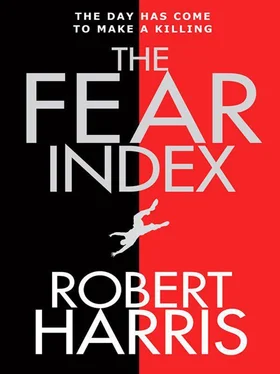Robert Harris - The Fear Index
Здесь есть возможность читать онлайн «Robert Harris - The Fear Index» весь текст электронной книги совершенно бесплатно (целиком полную версию без сокращений). В некоторых случаях можно слушать аудио, скачать через торрент в формате fb2 и присутствует краткое содержание. Жанр: Триллер, на английском языке. Описание произведения, (предисловие) а так же отзывы посетителей доступны на портале библиотеки ЛибКат.
- Название:The Fear Index
- Автор:
- Жанр:
- Год:неизвестен
- ISBN:нет данных
- Рейтинг книги:4 / 5. Голосов: 1
-
Избранное:Добавить в избранное
- Отзывы:
-
Ваша оценка:
- 80
- 1
- 2
- 3
- 4
- 5
The Fear Index: краткое содержание, описание и аннотация
Предлагаем к чтению аннотацию, описание, краткое содержание или предисловие (зависит от того, что написал сам автор книги «The Fear Index»). Если вы не нашли необходимую информацию о книге — напишите в комментариях, мы постараемся отыскать её.
The Fear Index — читать онлайн бесплатно полную книгу (весь текст) целиком
Ниже представлен текст книги, разбитый по страницам. Система сохранения места последней прочитанной страницы, позволяет с удобством читать онлайн бесплатно книгу «The Fear Index», без необходимости каждый раз заново искать на чём Вы остановились. Поставьте закладку, и сможете в любой момент перейти на страницу, на которой закончили чтение.
Интервал:
Закладка:
In the kitchen he leaned against the granite island and studied the knives. On his instructions they had been bagged and sealed in the hope that they might yield fingerprints. This part of Hoffmann’s story he did not understand. If the intruder had come prepared to kidnap, surely he would have armed himself properly beforehand? And a kidnapper would have needed at least one accomplice, maybe more: Hoffmann was relatively young and fit – he would have put up a struggle. So was the motive robbery? But a simple burglar would have been in and out as quickly as he could, taking as much as he could carry, and there was plenty portable here to steal. Everything therefore seemed to point to the criminal being mentally disturbed. But how would a violent psychopath have known the entry codes? It was a mystery. Perhaps there was some other way into the house that had been left unlocked.
Leclerc went back out into the corridor and turned left. The rear of the house opened into a large Victorian-style conservatory, which was being used as an artist’s studio, although it was not exactly art as the inspector understood that term. It looked more like a radiographic unit, or possibly a glazier’s workshop. On the original exterior wall of the house was a vast collage of electronic images of the human body – digital, infrared, X-ray – along with anatomical drawings of various organs, limbs and muscles.
Sheets of non-reflecting glass and Perspex, of various sizes and thicknesses, were stored in wooden racks. In a tin trunk were dozens of files, bulging with computer images, carefully labelled: ‘MRI head scans, 1-14 Sagittal, Axial, Coronal’; ‘Man, slices, Virtual Hospital, Sagittal amp; Coronal’. On a bench were a light box, a small vice and a clutter of inkpots, engraving tools and paint brushes. There was a hand drill in a black rubber stand, with a dark blue tin next to it – ‘Taylor’s of Harrogate, Earl Grey Tea’ – crammed full of drill heads, and a pile of glossy brochures for an exhibition entitled ‘Human Contours’ due to begin that very day at a gallery on the Plaine de Plainpalais. There was a biographical note inside: ‘Gabrielle Hoffmann was born in Yorkshire, England. She took a joint honours degree in art and French from the University of Salford, and received an MA from the Royal College of Art, London. For several years she worked for the United Nations in Geneva.’ He rolled the brochure into a cylinder and stuffed it into his pocket.
Next to the bench, mounted on a pair of trestles, was one of her works: a 3D scanned image of a foetus composed of about twenty sections drawn on sheets of very clear glass. Leclerc bent to examine it. Its head was disproportionately large for its body, its spindly legs drawn up and tucked beneath it. Viewed from the side it had depth, but as one shifted one’s perspective to the front it seemed to dwindle, then vanish entirely. He could not make out whether it was finished or not. It had a certain power, he was forced to concede, but he couldn’t have lived with it himself. It looked too much like a fossilised reptile suspended in an aquarium. His wife would have thought it disgusting.
A door from the conservatory led out to the garden. It was locked and bolted; no key nearby that he could find. Beyond the thick glass, the lights of Geneva wavered across the lake. A solitary pair of headlights made its way along the Quai du Mont-Blanc.
Leclerc left the conservatory and returned to the passage. Two more doors led off it. One turned out to be a lavatory containing a big old-fashioned water closet, into which Leclerc took the opportunity to relieve himself, and the other a storage room filled with what appeared to be detritus from the Hoffmanns’ last house: rolls of carpet tied with twine, a bread-making machine, deckchairs, a croquet set, and, at the far end, in pristine condition, a baby’s cot, a changing table, and a clockwork mobile of stars and moons.
3
Suspicion, the offspring of fear, is eminently characteristic of most wild animals.
CHARLES DARWIN, The Descent of Man (1871)According to the records subsequently released by the Geneva medical service, the ambulance radioed to report that it was leaving the Hoffmanns’ residence at 5.22. At that hour it was only a five-minute drive through the empty streets of central Geneva to the hospital.
In the back of the ambulance Hoffmann maintained his refusal to obey regulations and lie down on the bed, but instead sat upright with his legs over the side, brooding and defiant. He was a brilliant man, a rich man, accustomed to being listened to with respect. But now suddenly he found he had been deported to some poorer and less-favoured land: the kingdom of the sick, where every citizen was second class. It irritated him to recall how Gabrielle and Leclerc had looked at him when he had showed them The Expression of the Emotions in Man and Animals – as if the obvious connection between the book and the attack was merely the fevered product of an injured brain. He had brought the volume with him; it was resting in his lap; he tapped his finger against it restlessly.
The ambulance swerved around the corner and the female attendant put out her hand to steady him. Hoffmann scowled at her. He had no confidence in the Geneva police or in government departments generally. He had no confidence in anyone much, except himself. He searched his dressing gown pockets for his mobile.
Gabrielle, watching him from the opposite seat, next to the ambulance woman, said, ‘What are you doing?’
‘I’m calling Hugo.’
She rolled her eyes. ‘For God’s sake, Alex…’
‘What? He needs to know what’s happened.’ As Hoffmann listened to the number ringing, he reached over and took her hand to mollify her. ‘I’m feeling much better, really.’
Eventually Quarry came on the line. ‘Alex?’ For once his normally languid voice was strained with anxiety: when is a phone call before dawn ever good news? ‘What the hell is it?’
‘Sorry to call this early, Hugo. We’ve had an intruder.’
‘Oh, God, I’m so sorry. Are you all right?’
‘Gabrielle’s okay. I got a whack on the head. We’re in an ambulance going to the hospital.’
‘Which hospital?’
‘The university, I think.’ Hoffmann looked at Gabrielle for confirmation. She nodded. ‘Yeah, the university.’
‘I’m on my way.’
A couple of minutes later the ambulance swept up the approach road to the big teaching hospital. Through the smoked-glass window Hoffmann briefly glimpsed its scale – a huge place: ten floors, lit up like some great foreign airport terminal in the darkness – then the lights vanished as if a curtain had been pulled across them. The ambulance descended along a gently circling subterranean passage and pulled to a halt. The engine was cut. In the silence, Gabrielle gave him a reassuring smile and Hoffmann thought: Abandon hope all ye who enter here. The rear doors swung open on to what looked like a spotlessly clean underground car park. A man shouted in the distance, his voice echoing off the concrete walls.
Hoffmann was instructed to lie down, and this time he decided not to argue: he had entered into the system; he must submit to its processes. He stretched out, the bed was lowered, and with a horrible feeling of helplessness he allowed himself to be wheeled along mysterious factory-like corridors, staring up at the strip lighting until, at a reception desk, he was briefly parked. An accompanying gendarme handed over his paperwork. Hoffmann watched as his details were registered, then turned his head on the pillow and glanced across the crowded room to where a television news channel played to a heedless audience of drunks and addicts. On the screen, Japanese traders with cell phones clamped to their ears were shown in various attitudes of horror and despair. But before he could find out any more, he was on the move again, down a short corridor and into an empty cubicle.
Читать дальшеИнтервал:
Закладка:
Похожие книги на «The Fear Index»
Представляем Вашему вниманию похожие книги на «The Fear Index» списком для выбора. Мы отобрали схожую по названию и смыслу литературу в надежде предоставить читателям больше вариантов отыскать новые, интересные, ещё непрочитанные произведения.
Обсуждение, отзывы о книге «The Fear Index» и просто собственные мнения читателей. Оставьте ваши комментарии, напишите, что Вы думаете о произведении, его смысле или главных героях. Укажите что конкретно понравилось, а что нет, и почему Вы так считаете.










